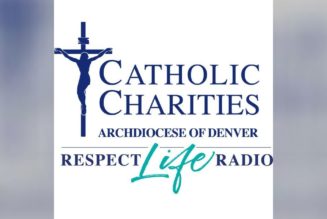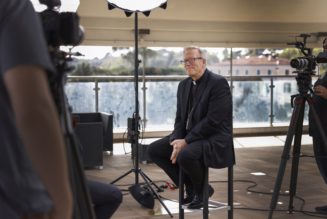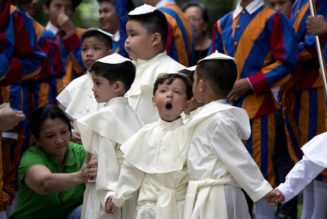“I find the whole situation unusual, because, in my view, the evidence of plagiarism is compelling and demonstrative,” Dougherty told CNA. “This isn’t a unique case with Bishop Robson. I have other bishops with dissertations that are in a similar situation.”
Another accusation
In a second completed manuscript, Dougherty analyzes the award-winning 2001 doctoral dissertation of Irish priest Father Aidan O’Boyle.
O’Boyle’s dissertation, “Towards a Contemporary Wisdom Christology: Some Catholic Christologies in German, English and French 1965-1995,” was published in 2003. The book can be purchased on Amazon and Google Books.
The Irish priest told CNA in November that he was “very shocked” by the accusation, which he had not previously been made aware of. Repeating several times during the phone conversation that he was shocked, he said, “I can’t believe there would be anything not right about my [dissertation],” which he noted had an advisor and a second reader.
“I would have thought everything would be OK.”

In his paper, “Using the Principles of Textual Criticism to Persuade Others of Plagiarism,” Dougherty alleges O’Boyle plagiarized by using passages from the works of other scholars without attribution.
To back up his accusation, Dougherty provides side-by-side comparisons of O’Boyle’s text with the text of others, showing examples of verbatim, or nearly verbatim, passages.
Some of these side-by-side comparisons can be viewed in the document below.
Different kinds of plagiarism
Dougherty also draws attention to a kind of plagiarism he calls “Remember-and-Type,” which he compares to the more standard expression, “copy-and-paste plagiarism.”
“Remember-and-type” plagiarism, according to Dougherty, happens in disciplines like theology, which rely on books and articles usually accessed in print format, rather than in the form of an e-book.
“If humanities plagiarists are not always electronically copying-and-pasting when plagiarizing, then they are copying from a (physical) print book or print journal issue,” Dougherty explains in his paper.
“Instead of using the quick Ctrl+C and Ctrl+V keystrokes, the humanities plagiarist uses a much slower process,” he continues in the article. “The plagiarist must look at the printed text, remember a relatively small portion, type that portion letter-by-letter into a word-processing program, and then repeat the process successively.”
Like with Robson’s dissertation, Dougherty has asked the Gregorian to withdraw O’Boyle’s doctoral degree and retract the book version.
Theologians complain
Three theologians who are still active in academia and allege their works were plagiarized by O’Boyle have also written to the Gregorian with the same requests.
One of the allegedly plagiarized scholars is Georgetown theology professor Father Leo D. Lefebure. The other two professors declined to be interviewed for this story and asked that their names not be included.

Lefebure told CNA via email on Nov. 11 that he “was shocked and deeply disappointed” to learn that his own doctoral dissertation, published with small revisions as a book in 1988, had been used without attribution.
The two books have similar titles: O’Boyle’s is “Towards a Contemporary Wisdom Christology: Some Catholic Christologies in German, English and French (1965-1995),” while Lefebure’s is “Toward a Contemporary Wisdom Christology: A Study of Karl Rahner and Norman Pittenger.”
“I have long respected the Gregorian University, and I spoke on its campus in 2005 when Georgetown University and the Gregorian University jointly sponsored a commemoration of the Second Vatican Council,” Lefebure said. “I was angered that [O’Boyle] continues to enjoy the benefits of his theft of intellectual property and his deception of the Gregorian University.”
In his letter to the university, a copy of which was provided to CNA, Lefebure stated that the Jesuit priest and retired professor who directed O’Boyle’s 2001 dissertation had also expressed “dismay” at the situation and “endorsed the recommendation” that the degree be revoked and the book withdrawn from publication.
Lefebure’s letter also said that O’Boyle “repeatedly reproduces major sections of my text without any attribution. He even concludes his work with my words — again without attribution. He reproduces the work of many other authors without attribution. This is truly a remarkable theft of intellectual property, a patchwork of stolen materials!”
As of publication, Dougherty, Lefebure, and Newman have not received any response from the Gregorian to their letters requesting that Robson and O’Boyle’s dissertations be retracted.
The Gregorian’s response
The Gregorian told CNA in a Nov. 21 statement it is following its protocols in response to the accusation against O’Boyle, and will determine, “if, in fact, there is a case of plagiarism according to the norms in force during the time of the student’s program.”
In policies updated in May 2020, the Gregorian says that “whenever the University receives the report of possible plagiarism in an already published doctoral dissertation” the vice rector must establish a commission of at least three professors or teachers, with at least one expert external to the university, to examine the claim.
The commission will give its opinion on whether plagiarism occurred, and an academic council will vote on whether to withdraw the dissertation and its accompanying degree. The university’s rector should communicate the decision to the Vatican’s Congregation for Catholic Education, which oversees pontifical universities.
“Having received an accusation of plagiarism against a student who completed his doctorate in the Faculty of Theology at the Pontifical Gregorian University in 2003, the University has begun the protocol outlined in the Norms regarding Plagiarism as well as the Ethical Norms of the University,” the Gregorian’s statement said.
“A Commission has been formed to examine the dissertation in question, to determine: 1. If, in fact, there is a case of plagiarism according to the norms in force during the time of the student’s program. 2. The gravity of any plagiarism found; 3. Recommendations regarding the validity of the work required for the degree granted.”
The statement concluded by quoting from its “Norms of University Ethics,” that “The University expects from its teaching staff and students a high level of commitment and dedication … and a conduct which conforms to good behavior, to the precepts of the Gospels, and to the norms for academic life.”
The Gregorian’s norms define plagiarism as “the attribution to one’s self of the intellectual property of the text or of the content of someone else’s work, in any of its parts.”
The guidelines go on to say that “in the environment of academic studies, plagiarism consists most often in the inclusion of a written work ‘of a text taken from another author without the usual indication and precise reference to the source.’”
The sanctions for plagiarism in a doctoral dissertation can include a written admonition and the withdrawal of the dissertation. The sanctions will go on the student’s record and the university, “in the most serious cases,” may expel the student.

Father Mark Lewis, the academic vice rector, told CNA in September that plagiarism can be found at any university, and the Gregorian is no exception.
He said it is up to individual teachers to find and discipline plagiarism by their students, but it can be a challenge to get the Gregorian’s professors to properly report acts of plagiarism to the dean.
Father Kevin Flannery, S.J., professor emeritus at the Gregorian, told CNA in September that plagiarism is like lying and “lying is immoral.” It also undermines both the person who plagiarized and the academic institution where it took place, he said.
Lewis said he believes confronting plagiarism by students should be more pedagogical than punitive.
“Less emphasis on punishment — though there are sanctions — more emphasis on teaching,” he said, noting that the university wants to teach its students how to use proper research methods, which can help prevent unintentional plagiarism, as well as the importance of original thinking and citations for sources.
Lewis said that he prefers a decentralized approach to plagiarism, where the student’s teacher, who is in the best position to judge the situation, decides whether and which sanctions to apply.
“There’s no perfect way of finding [plagiarism],” Lewis said, noting that one method he uses is searching for a string of words on Google to see if it brings up a source that was not attributed.
Most universities also employ plagiarism-detection software, and the Gregorian implemented a new program, called Compilatio, Oct. 1.
But as Lewis pointed out, programs such as Compilatio or Turnitin are not as accurate for checking doctoral dissertations, because they compare students’ work with an online database, while dissertations rely heavily on library books for sources.
Dougherty, in his latest manuscript, made the same point. He also noted that even insignificant changes to a text, whether intentional or made through error, could keep detection software from picking up on uncited passages.
What’s at stake?
Plagiarism expert Dougherty said that, beyond questions of honesty, plagiarism causes problems in academia because “it pollutes the downstream scholarly literature.” But there is also an ecclesiastical aspect, since candidates for bishop must have a doctorate in canon law or sacred theology, or be considered an expert in one of those areas.
There are many different kinds of plagiarism, Dougherty said, but “what they all have in common, though, is that the discoveries of other people are being passed off as new work and degrees are being granted on the basis of fundamentally unoriginal work.”
“That’s bad for academia, it’s bad for the Church,” he stated. If a pontifical university awards doctorates on the basis of plagiarized doctorates, “and then these clerics go on to be bishops in the worldwide Church, there’s the academic scandal, but then there’s the ecclesiological problem.”
Lefebure, the Georgetown professor, said that “in Washington, D.C., it has long been axiomatic that the cover-up is very often worse than the offense.”
“It is one problem for a student to plagiarize material and go undetected; it is a far more serious problem if a university is aware of plagiarism and tacitly endorses this practice by allowing plagiarists to continue to enjoy the fruits of their theft and deception,” he said.
“If an institution of higher education cannot distinguish genuine from non-genuine dissertations, even awarding prizes to the latter, then we have an institution in crisis,” Dougherty told CNA.
“In this case, Father Schachenmayr identified the problem, and the Pontifical Gregorian University doubled down in response. In my view, the Pontifical Gregorian University’s 2020 defense (and 2021 defense) of the defective dissertation is worse than the fact that the dissertation is defective. Failure by a single individual is bad, but institutional corruption is a failure on a different order of magnitude.”
Join Our Telegram Group : Salvation & Prosperity




![“I’d never been involved in anything as secret as this”: A riveting oral history of the operation to kill Osama bin Laden [language warning]…](https://salvationprosperity.net/wp-content/uploads/2021/05/id-never-been-involved-in-anything-as-secret-as-this-a-riveting-oral-history-of-the-operation-to-kill-osama-bin-laden-language-warning-327x219.jpg)



